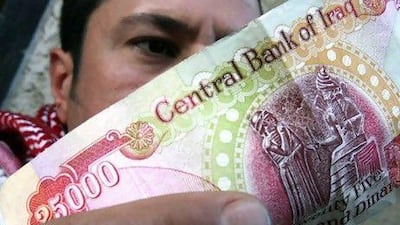Iraq wants to reduce its number of local banks by more than a third, creating as many as 15 takeover targets for international lenders seeking to gain a foothold in the country.
The move follows last week's disclosure that Standard Chartered has started discussions about the potential acquisition of a stake in Warka Bank, said the deputy governor of Iraq's central bank.
"We are trying to evolve these private banks into real institutions," said Mudher Kasim. "The first step was to segregate shareholders from management and increase the capital requirement to push the banks to consolidate, merge or join up with foreign banks to practice good standards and service."
The central bank has urged lenders to double their capital to 100 billion dinars (Dh313.7 million) this year.
It wants them to further increase capital to 150bn dinars by the end of June next year and 250bn dinars in 2013.
There are 37 banks in Iraq, with the sector dominated by seven state-owned institutions. There are seven foreign banks, with seven more in which foreign banks hold stakes in Iraqi counterparts.
The remainder mainly comprise small private banks owned by affluent Iraqi families.
The central bank wants to reduce the number of banks operating in the country to 22.
Most of the banks have been able to raise their capital from their shareholders or owners, or through issuing additional shares on the Iraq Stock Exchange. Only two banks have failed to meet the capital requirements so far.
"The banking sector is at a very early stage of development in Iraq, one could even describe it as embryonic," said Shwan Taha, the chief executive at Rabee Securities, a brokerage house in Erbil. "Any normal banking operation is an opportunity in Iraq."
Mr Taha forecasts double-digit growth for the sector in the medium term as it keeps up with economic development of the country.
Last week, The National reported that Standard Chartered was in negotiations to acquire Warka Bank as it struggled to meet the capital requirements.
Basrah International Bank for Investment, another bank that has failed to increase its capital, is currently under conservatorship. A legal representative has been appointed by the central bank to oversee its operations until it publishes its third-quarter results, Mr Kasim said. Then a decision will be made whether it continues as a going concern.
Three other banks are in merger talks, Mr Kasim said. He declined to identify them.
He said that in the next phase of capital increases, more banks should consolidate to meet the requirements.
The banking system in Iraq remains underdeveloped, particularly for a country of more than 31 million people. Mr Kasim estimates there are only 800 branches in the country, which contributes to a huge and persistent reliance on cash. At present, 67 per cent of money supply circulation happens outside of banks.
"That obviously has security and logistics challenges and insurance implications that you don't normally associate with banking," Mr Kasim said.
Private banks need to expand beyond fee-paying business to providing loans and project financing.
"The problem with most Iraqi banks today is that they are too risk-averse and conservative," Mr Kasim said. "They don't have any desire to give out loans, while profits come from money transfers abroad, through options sales and investment in treasury bills, banking activities which are almost risk-free. We want to encourage real loans-to-deposit activity."
Loans to capital is at 1.5 times, with regulations permitting up to eight times. Current lending is at 8 trillion dinars to the private sector, with private banks contributing 2.5tn dinars.
Now attention is turning to communication systems and cooperation. There are 239 ATMs in Iraq, but the individual banks have yet to reap the benefits of linking up. Mr Kasim said half the machines may not be working at any given time and there were security implications as to where to locate new ones should the system expand. Plans are also under way to introduce a mobile payment system and a national Switch system, and to create a credit bureau.

